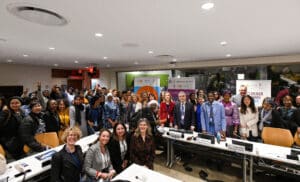ENGAGING WITH RELIGIOUS LEADERS TO END FGM/C: THE CASE OF NAROK & ISIOLO COUNTY
Introduction:
The Girl Generation: Support to the Africa-led Movement to end FGM/C Programme (TGG-ALM) is actively collaborating with religious leaders in various areas to end FGM/C. Religious texts are used as reference materials to guide discussions on FGM/C. While there may be differing interpretations of these texts, the highest level of leadership generally agrees that FGM/C is not supported by religious teachings. In Isiolo County, where Islam is the predominant religion, there is a discrepancy between the stance of the Ulama (Muslim scholars) and the local Imams regarding FGM/C.
What is our Approach?
The TGG-ALM programme engages religious leaders, including Imams, Priests, and community elders, through platforms such as kongamanos (community conferences/gatherings) and intergenerational dialogues. The aim is to foster conversations, build relationships, and encourage religious leaders to openly denounce FGM/C. By leveraging their influence and platforms, it is hoped that religious leaders can help challenge harmful practices, shift societal norms, and promote alternative non-harmful rituals or ceremonies.
What Challenges do we face?
Working with religious leaders to end FGM/C can present several challenges. Some of the common challenges include:
- Deeply held beliefs: Some religious leaders firmly believe that FGM/C is a religious requirement or have interpreted religious texts in a way that supports the practice. Challenging these beliefs and providing alternative interpretations can be difficult and requires engaging in theological discussions.
- Cultural traditions: FGM/C is often deeply ingrained in the cultural traditions of communities where religious leaders hold influence. They are hesitant to change these practices due to fear of losing their influence and concerns about compromising their religious or cultural identity.
- Community resistance: Religious leaders face resistance from community members who strongly adhere to these traditional practices. These community members view any opposition to FGM/C as a challenge to their cultural norms and traditions.
- Fear of backlash: Religious leaders who speak out against FGM/C fear backlash from their community members or other religious leaders who support the practice. This fear deters them from openly advocating against FGM/C.
- Low levels of knowledge and awareness: Some religious leaders have a limited understanding of the physical and psychological harm caused by FGM/C. It is necessary to provide them with accurate information and education to dispel misconceptions and foster a deeper understanding of the negative consequences of the practice.
- Limited resources: Religious leaders lack the necessary resources and support to actively engage in efforts to end FGM/C. This includes financial resources, training programs, and community outreach initiatives.
- Gender dynamics: In some communities, there is gender imbalance in religious leadership, with predominantly male religious leaders having the final say on matters related to FGM/C. Addressing gender dynamics and ensuring the inclusion of female religious leaders in discussions and decision-making processes is crucial for effectively combating FGM/C.
Despite these challenges, efforts to engage religious leaders in ending FGM/C can yield positive outcomes and contribute to changing societal norms and behaviors. It requires patience, dialogue, education, and collaboration to promote a deeper understanding of the harm caused by FGM/C and to encourage religious leaders to actively advocate for its abandonment.
What strategies are we using:
When engaging religious leaders to end FGM/C, TGG: ALM grantees in both Isiolo and Narok counties have employed various strategies that foster understanding, promote dialogue, and encourage positive change. Here are some strategies that are currently being utilized:
- Education and awareness: Providing religious leaders with accurate information about the physical, emotional, and psychological consequences of FGM/C. Offering training sessions, workshops, or seminars that highlight the health risks and human rights implications associated with the practice. This helps to dispel misconceptions and build a foundation for informed discussions.
- Theological dialogue: Engaging in theological discussions with religious leaders, referencing religious texts and teachings that emphasize the values of compassion, respect for human dignity, and the protection of bodily integrity. Encouraging critical analysis of existing interpretations of religious texts and promoting alternative interpretations that discourage FGM/C. This is led by champions who are also religious leaders.
- Building partnerships: Establish partnerships between religious leaders and organizations working to end FGM/C. Collaborating with religious institutions to develop joint initiatives, awareness campaigns, or community outreach programmes. Engaging religious leaders as allies and stakeholders in the efforts to end FGM/C. In the case of working with Islamic religious leaders we use this resource on delinking FGM from Islam by UNFPA.
- Empowering religious leaders as advocates: Recognizing and supporting religious leaders who are willing to take a stand against FGM/C. Providing them with platforms, resources, and training to become advocates within their communities.
- Addressing cultural and community concerns: Respecting and understanding the cultural context in which FGM/C occurs. Engaging with community members, families, and other influential figures to address their concerns and fears about abandoning the practice. Highlight the importance of preserving cultural identity while eliminating harmful practices.
- Sensitization and dialogue sessions: Organizing sensitization and dialogue sessions where religious leaders can engage in open discussions with community members, women’s groups, youth, and other stakeholders. These sessions provide a platform for sharing experiences, addressing misconceptions, and fostering understanding between religious leaders and the community.
- Engaging youth and women’s groups: Working closely with youth and women’s organizations to empower them as agents of change. Collaborating with religious leaders to involve these groups in community awareness campaigns, advocacy efforts, and educational programs.
What could be strengthened?
- Support networks and resources: Establishing support networks for religious leaders, providing them with resources, information, and guidance on addressing FGM/C-related issues. Offering platforms for sharing best practices and experiences among religious leaders from different regions or communities.
- Monitoring and evaluation: Regularly assessing the impact and effectiveness of engagement strategies with religious leaders. Collecting data, measuring progress, and identifying areas for improvement. This helps to refine approaches and develop evidence-based interventions.
- To enhance collaboration with religious leaders, the programme has recognized the need to train selected religious leaders as champions who can engage their colleagues effectively. Lay champions have proven ineffective in this context. The programme is providing safeguarding training to religious leaders to ensure they approach discussions about FGM/C with sensitivity. The engagement of religious leaders also takes place through the Isiolo Muslim Imam’s Forum, facilitating a shared understanding among the leaders.
Our Successes and Lessons
Despite the obstacles, there have been notable successes within the programme. Certain religious figures have emerged as dedicated advocates, actively leading campaigns against FGM/C within their communities. These leaders have taken proactive steps by incorporating messages to end FGM/C into their sermons, thereby playing a crucial role in spreading awareness and fostering transformative change concerning this harmful practice.
- Challenging patriarchal structures and beliefs: Engaging religious and traditional leaders is crucial for addressing FGM/C. However, it is important to recognize that overall progress in challenging patriarchal structures, beliefs, and practices has been limited. This highlights the need to go beyond surface-level engagement and work towards structural transformation to achieve equity and justice for all.
- Inclusion of women faith leaders (where applicable) and women knowledgeable in religion: In various religions, some women are knowledgeable on matters of faith while in other faiths, there are women recognized as faith leaders. Women have often been excluded from faith matters decision-making processes and leadership roles within religious communities. Recognizing the importance of their perspectives and contributions is essential for achieving gender equality and addressing FGM/C and other forms of violence effectively.
- Strengthening partnerships and coalitions: Building coalitions among faith actors, feminists, and social justice movements can amplify efforts to address FGM/C. Forging new partnerships at all levels to foster collaboration and collective action. Strengthening advocacy and community strategies to challenge existing power structures and overcome barriers to gender equality.
By:
David Kawai, Community Implementation Lead-TGG-ALM based at Amref Health Africa
Teresia Warui- Programme Coordinator TGG – ALM- Based at ActionAid Kenya
Diram Duba- Project Coordinator-TGG-ALM- based at ActionAid Kenya
Ann Njuguna- Communications Manager-TGG-ALM based at Options Consultancy Services

